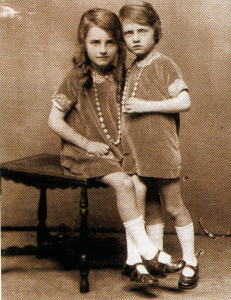
The chapel has gone now, leaving no sign that it ever existed. No-one wanted it any more, and a bungalow has taken its place.
The old, narrow, hump-backed bridge over the River Witham is still there, but scarcely used now that the splendid new one towers beside it. The river still ripples along its meandering way to the sea, and the narrow road running alongside for miles is still narrow, but no longer strewn with potholes.
In the 1920s and 30s the chapel was the centre of the universe. The rural population was widely scattered, and worshippers walked a long way to attend the services.
Cars were a luxury enjoyed by only a few. For the majority it was Shanks’s pony – our feet.
On special occasions the chapel was packed solid, and the Sunday School Anniversary was no exception. We children spent weeks learning our recitations and the special songs. There were new dresses for the girls, as we were to stand up on the platform in front of the congregation to say our ‘piece’.
Mother was very clever with her Singer sewing machine, a present for her 21st birthday in 1909, and she made all the dresses and coats for her two little girls. By the light of oil lamps she would be whizzing away until long past midnight to make sure our new dresses were finished in time. They were always beautiful, very fashionable and much admired, but always identical, and I didn’t want to look like my older sister. I wanted to look like me, so every year I threw a paddy and sulked and stormed, all to no avail. Worse still, the dresses had to be kept for ‘very best’ until the next year’s Anniversary came around, and then the hems were let down and they became ‘second best’.
A mighty tea was provided on the Monday following the Sunday celebrations, and a repeat of the Sunday service. Then there were games in a nearby field, with little prizes like an orange or a bar of chocolate, but our annual treats were not over.
Three miles along the river bank was another chapel, nestling by the waterside, and their Anniversary was later than ours. For some long-forgotten reason, my organist mother and we two girls were always invited to their Monday night ‘do’ and we gleefully gathered on the bank of the river by the hump-backed bridge, awaiting the arrival of
the horse-drawn flat-bottomed barge, full of excited children who had been towed from the chapel three miles up river.
It was bedded with clean straw. There was nothing to sit on, but we didn’t care. We had no thoughts of what the usual cargo was. It might have been coal, or cattie, or both. Who knows? It didn’t matter.
On board Nellie, their organist, was banging out hymns on an old harmonium, the latter hauled on to the barge by brute strength, and muscle. This trip was specially for us, and we were going to drift down the river singing and shouting and making as much din as we could. Parents were waving outside their homes dotted along the bank and we couldn’t have felt more important if we’d been royalty.
We had a bird’s eye view of the swans as they hugged the side of the river, and the herons with their long legs, flying away as we approached. Ducks scuttled and quacked in annoyance at our intrusion. The sloping banks were a profusion of colour -buttercups, kingcups, cuckoo flowers, cowslips, daisies, dandelions and brilliant poppies. Cows and sheep grazed peacefully by the river until we came along and caused a stir. Sheep darted hither and thither, wondering what all the hullabaloo was about, but the cows just stared with big brown eyes and carried on chewing their cud.
Fishermen hauled in their lines when they heard us coming. There’d be no fish caught for hours after such a noisy invasion: we scared all the fish for miles.
The wonderful trip had to come to an end when we reached the chapel, and we all clambered up the river bank, in our ‘second best’ dresses, of course, to be welcomed by the chapel elders and ushered into the schoolroom for tea. What a spread to feast our eyes upon! There were sandwiches, trifles, mountains of home-made cakes and, best of all, huge dishes full to overflowing with the plumpest, juiciest shrimps I’d ever seen. Soon there was little left – just piles of shrimps’ heads and legs.
When this social evening ended, my father was waiting with our pony and trap to drive us home. Reins were never needed on the return journey. Father sat back as Tommy, our pony, head up and homeward-bound, set off like a rocket.
More than 60 years have passed since I left this place of my birth, and a lot of water has flowed under the old hump-backed bridge. I have travelled far and wide, on planes and ships, in cars and coaches, and eaten strange and exotic dishes at home and abroad, but the best is still remembered.
No shrimp has ever tasted so good as in those far-off days in that little waterside chapel schoolroom, and no trip has ever been more exciting than standing on thick straw in an old barge, sailing on the river.
Hazel Gill








